- Home
- Susan Hill
The Boy Who Taught the Beekeeper to Read: And Other Stories Page 4
The Boy Who Taught the Beekeeper to Read: And Other Stories Read online
Page 4
They were possessive, passionate and jealous of it and everything it contained. The feeling they had for it was as strong and vital as their love for their father and the memory of their mother. They were shocked by the power of it.
They could not say that they liked Leila Crocker. They could not say that they disliked her.
‘Her hair is very tightly permed,’ Kay said.
‘But her shoes are good.’
At the department store during one lunch hour Kay had suddenly told the other fitter about it. Anne McKay’s hirsute face had lit up.
‘Oh, Kay, that is so very nice! Isn’t that nice for him? I think that’s lovely.’
What is ‘lovely’? Kay thought, panicking. I have told her that he brought a woman to tea. Her face betrayed her terror. Anne McKay reached out and touched her arm. They were seated in the old broken-down basket chairs in the dusty little staffroom.
‘I meant how lovely for him to have some companionship. I know you miss your mother, of course you do, but life has to move on.’
Does it? Why does it? Why can it not stay as it is? Kay took a bite from her sandwich but could not swallow it.
‘You won’t be at home for ever, will you? Either of you.’
Won’t we? Why not? Why should we ever leave? Who could make us?
Kay jumped up, and went to the cloakroom and there spat the piece of sandwich violently into the lavatory basin.
‘I suppose,’ Nita said, hearing about it later, ‘that companionship is important.’
‘He has us. He isn’t alone.’
‘We should try to be fair.’
‘What is “unfair”?’
‘We are – well, isn’t it quite different?’
‘From what?’
‘I mean, it is just a different kind of companionship – friendship. Of course it is, Kay.’
But what the nature of the friendship or companionship was they could not have said.
It had been raining for almost a week, but now, as they walked the last hundred yards down the avenue, the sun came out and shone in their faces and reflected watery gold on the wet pavement and the house roof.
‘We must try to be fair,’ Nita said again.
They quickened their steps.
But the house was empty, as it was empty every evening for the next week, and after that, it seemed, was never empty again. It was the speed of it all that horrified them, the speed which was, Kay said, unnecessary and unseemly.
‘And rather hurtful.’
But their father was now oblivious to everything except the woman he was to marry. For he would marry Leila Crocker, he said, telling them, with neither warning nor ceremony, the next time he spent an evening at home with them.
‘I should like you to know,’ he had said, laying down his soup spoon, ‘that I have asked Leila to be my wife.’
The room went deathly silent and, it seemed to Kay and Nita, deathly cold. A chill mist seemed to creep in under the door and the window frame, curling itself round them so that they actually shivered. They could not look at him or at one another. They could do nothing.
‘I have found a very dear companion, a very fine person with whom to share the rest of my life. Your mother – her illness and her death – were – very difficult. I had not imagined – of course you hardly know Leila, but you will come to know her, and to love and admire her, I am quite certain of it. Quite certain.’
He beamed innocently from one to the other.
‘This is going to be a very happy home once more.’
*
It was like their bereavement all over again but in a way worse, because death was the final certainty, and this was uncertain, this would go on and on. Their whole lives would change but they did not know how. Their future would be entirely different but they could not picture it.
That first night, after he had told them, the silence had been so terrible, his eager, beaming face so open and expectant, that Nita had prayed to die, then, there, rather than have to face any of it and Kay had wished her tongue cut out, for any words she might feel able to utter would be wrong and false and surely choke her.
In the end, after what might have been a minute or a lifetime, their father said, ‘I hope very much that you are pleased.’
Kay swallowed.
‘Of course, your mother –’
Nita leaped up, pushing her chair back with such force that it toppled and crashed over behind her. ‘She – Mother has nothing to do with this – please do not talk about Mother.’
‘Perhaps –’ Kay heard her own voice, strangled and peculiar. ‘Perhaps you may be able to understand what a shock this is.’
‘But you are happy for me? You do share this happiness with me?’
His face was that of a child anxious for approval, and their feelings as they looked at him were impossible, confused, painful.
‘She has given me a new life.’
They fled.
The next morning Nita woke Kay up before seven o’clock.
‘I am going to the service. Will you come?’
Kay turned onto her back. They had not been to church since the Sunday after the funeral.
‘What will you pray for?’
‘Guidance.’
‘For him?’
‘For ourselves.’
‘For it to end – for this – this thing to be over.’
Nita sat down on her sister’s bed. ‘I think,’ she said carefully, ‘that it will not.’
‘No.’
‘And I find I cannot cope with – I have never felt like this in my life.’
‘What do you feel?’
‘I think it is hatred. And anger. Great anger.’
‘Betrayal.’
‘Is it?’
‘But not us – it is not us he is betraying.’
‘No.’
‘It is indecent. He is an old man.’
‘Perhaps if it had been in a few years’ time.’
‘That is the worst, isn’t it? Think of all those tears. All that – and now to think it was all lies and falseness.’
‘Oh I don’t think it was. He did –’
‘Love Mother?’
‘Yes.’
‘Then how could he?’
‘If I don’t deal with this terrible hatred it will become destructive of everything. I hardly slept.’
‘Burrowing.’
‘Yes. It’s like that. A canker. Will you come?’
‘No.’
‘We have to try. We must try.’
‘For her sake?’
‘No, for him. Of course for him.’
‘Do you like her?’
‘We barely know her. I only say we should try.’
‘You are too good.’
Kay turned over and pressed her face hard into her pillow. Her mother seemed to be somewhere in the depths of it, as she was everywhere now, smiling, patient. Betrayed. ‘You will have to go by yourself,’ Kay said, tears pouring down her face.
The city restaurant had been full at ten minutes past one and so they had been obliged to share a table. That was how they had met.
‘I suppose she had been on the lookout for just such a man, eating alone.’
‘Kay –’
‘Unfair?’
‘Yes.’
‘It is all unfair.’
‘She is very nice to us.’
‘Why should she not be?’
‘We have not been altogether nice to her – we have perhaps been rather unwelcoming.’
‘Of course we have. She is unwelcome.’
Though so far Leila Crocker had behaved impeccably. She had been reserved, friendly but never effusive. Pleasant and careful.
‘It really is difficult to dislike her,’ Nita said.
‘I don’t care for her clothes.’
‘Well they are perfectly good clothes.’
‘Oh yes. Good clothes.’
Leila Crocker wore smart suits in plain colours, alternating them week by wee
k, cherry-red, ice-blue, camel, mauve. She was, she said, personal assistant to a managing director. The second time she came to the house, she told them that she was forty-four.
‘Why did she suppose her age was of any interest to us? It is no business of ours.’
Their father was almost thirty years older. They could not talk to him.
‘I hope that things will go on as they always have,’ he said.
‘How can they? How can anything ever be as it was?’
Kay ran her finger over and over the closed lid of the piano.
‘He is destroying all of it.’
‘Do stop doing that.’
‘Do you suppose he ever thinks – thinks of Mother?’
‘Surely he must.’
‘What? What can he think?’
‘You will take off the veneer.’
‘There is no one else left to defend her memory.’
‘Is that what we are for?’
‘What else?’
‘It is almost as though thirty-seven years had somehow –’
‘Well they have not.’ Kay spoke in a raw, furious whisper.
‘Do stop doing that. I think I shall go mad,’ Nita shouted, then went quite silent. They stared at one another fearfully.
‘Look,’ Kay said after a moment. ‘Look what is happening, what it is making us do. Everything is cracking and splintering and being destroyed. Even us.’
A month after Leila Crocker had first come to the house, Nita found her in the kitchen one evening.
‘I am cooking for us all.’
‘Oh, there is no need. I was going to make omelettes with a salad.’
‘I’m sure you would prefer roast chicken.’
‘And then,’ Nita said, going in, trembling, to her sister’s room, ‘I noticed it.’
‘Noticed what?’
‘How can he think of doing such a thing? How can he?’
The light had caught the ring on Leila Crocker’s hand as she had reached out to one of the kitchen taps.
Kay laid down her pen. Her diary was open on the desk in front of her.
‘The diamond hoop with the small sapphires?’
‘Yes.’
Though their mother had rarely worn it, saying it was too special, too dressy, it was to be kept for very special occasions, and those had rarely come, in such quiet, self-contained lives.
‘Are you sure?’
The words came out of Kay’s mouth as heavy and cold and separate as marbles.
‘Go down and see for yourself. If he has to give her a ring – well, people naturally do –’
‘Not the ring that belonged to their wife of thirty-seven years who has been dead for under a year. I think not.’
At two o’clock in the morning, Kay went into her sister’s room and, after hesitating a moment, her bed.
‘Ninny?’ She had not used the name for twenty years.
‘I’m not asleep.’
‘I don’t think I can bear it.’
‘I know.’
‘I feel as if I were a child.’
‘What would other people do? Different kinds of people?’
Kay thought of Anne McKay, and Mrs Willis. ‘Do you – do you believe she can know?’
They lay, picturing their mother, floating somewhere nearby, smiling, patient.
Is it for her? Nita thought, feeling her sister’s warmth to the side of her. As children they had often crept into one another’s beds. Is it really for Mother’s sake that I mind what is happening more than I have ever minded anything apart from her dying?
But in the end she turned on her side and took her sister’s hand and, after a few moments, slept, exhausted by the impossible, unanswerable questions.
‘We cannot possibly go to the wedding,’ Kay had said. But of course they did, and somehow got through the service, at which there were three hymns and two readings and Leila Crocker wore cream lace. The church and the hotel room afterwards were full of strangers. Their father’s face was flushed with excitement and open devotion.
Somehow, they got through all of it. Somehow, they stayed until the car had left the hotel courtyard, waved at by the strangers.
In the avenue, Kay stopped, took off her jacket and shook it out until the few paper rose petals drifted into the gutter.
The two weeks that followed were extraordinarily happy. They felt an unreal sense of freedom and contentment, in the house by themselves, answerable to no one. The sun shone; they set the table up on the terrace and ate supper there, and, at the weekend, breakfast and lunch as well.
They put a shield around themselves. Neither referred to their father or to the marriage. When postcards arrived, first from Rome, and then from Florence, they read and then discarded them without a word.
But on the morning they were due to return Nita cut fresh branches of philadelphus and put them in jugs about the house.
‘We have to try. We have a duty to try. Things may go perfectly well.’
From the very beginning they did not, though whose fault it was none of them could have told.
It was difficult to share their home with another, difficult to accept her as having precedence over them, difficult that she and their father slept in the same room, the old room in which their mother had slept in the years before her last illness, difficult to get used to changes of daily routine and the presence of their stepmother’s possessions hanging in wardrobes, filling drawers, displacing the old order of things. Difficult to find someone else in the house every evening when they returned home, at supper, at breakfast and for the whole of every weekend.
‘Difficult, difficult, difficult,’ Kay said, walking faster than usual up the avenue.
But difficult might have become less so. They might perhaps have adapted themselves to the new arrangement, in the end. Difficult was not painful or hurtful and it was pain and hurt which came very quickly.
‘What is happening?’ Nita said as they rounded the corner, and saw the removal van outside the house. ‘What is happening?’
They almost ran.
It was nearly over. The work had been going on for most of the day. All the old furniture from their mother’s sewing room and the small sitting room, as well as from the bedroom in which she had died, had gone. In the sitting room were a new, bright-blue sofa and chair, and a glass-fronted cabinet. The sewing room and bedroom were empty.
Their father met them in the hall, saw their faces, but could not manage to meet their eyes.
After that everything disintegrated, everything was swept away, or so it felt. Their mother’s clothes were cleared, and her papers. The photographs of her about the drawing room and their father’s study disappeared, though her pearls and her two pairs of good earrings did not go, their stepmother wore them.
‘How dare she?’ Kay said, banging into her father’s study. ‘How dare she take Mother’s things, her personal things, how could you let her?’
‘Please lower your voice. I remember that when your mother passed away –’
‘Died. She died.’
‘– you – and Nita – you said you would prefer not to have those things. As I understood.’
‘That did not give – your wife – the right to appropriate them.’
He stood up. ‘I gave them to her. I wanted her to have them. Leila took nothing.’
‘How could you give them – you?’
‘I think, I believe, that it is what –’
‘If you say it is what Mother would have wanted, I think I shall kill you.’
‘Kay –’
‘You let her throw out our mother’s furniture – clear her things.’
‘We did it together. It was time.’
‘For who?’
‘For me.’
‘You are a blind, cruel, besotted, foolish old man.’
At the top of the stairs, she almost collided heavily with Nita.
‘Whatever is happening? Why were you screaming?’
In her own room, Kay sobbed
tears of bitter pain and rage.
Nita had closed the door. ‘It is very hard,’ she said. ‘I hate this. I mind it as much as you do. I mind it for Mother’s sake and for us, but screaming at Father is not right – he loves her, he is besotted with her. He cannot see that she is doing anything wrong.’
‘He is being treacherous, utterly treacherous. He was married to Mother for almost forty years. He loved her, he saw her die and almost went mad with grief. We had to watch all that, bear all that. He has utterly, utterly betrayed her, bringing that woman here, marrying her in such haste, such a few months after – and making that – that vulgar display, that wedding – giving her Mother’s jewellery, helping her throw Mother’s things away – taking down the photographs.
‘She has no idea, none. She is completely insensitive and I do not care for her, I wish she had never come here – but I don’t blame her and I do not hate her. I blame him. I hate him. I can’t forgive him – I cannot –’
The tears this time were not of anger, but of misery and grief at everything lost, and after a moment Nita cried with her for the same loss, of their mother and of everything that had been hers, and for the loss of him, the loss of all love, for it seemed that their father had taken everything from them, and given it to his wife, taken his love for them and for their mother and theirs for him, taken his loyalty and sense of what was right. Taken their home and their place in it.
They sat holding one another on Kay’s bed as the light faded, and the empty room below and the empty room next door were like hollow caves carved out of their own hearts.
They lived in the house for another five months, and in that time everything changed, piece by piece. Everything that was old and familiar and belonged to their past went and was replaced by the new, the strange, until only their father’s study and their own rooms remained unaltered. They scarcely spoke to him, avoided him altogether if they could. To their stepmother they were polite, with all the careful, wary courtesy of strangers, but they saw, in her face, in her eyes, that she was indifferent to them.

 Mrs De Winter
Mrs De Winter A Question of Identity
A Question of Identity The Various Haunts of Men
The Various Haunts of Men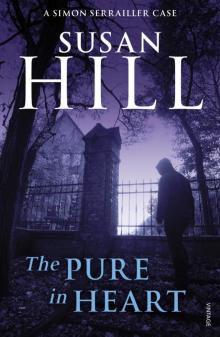 The Pure in Heart
The Pure in Heart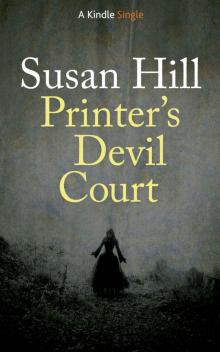 Printer's Devil Court
Printer's Devil Court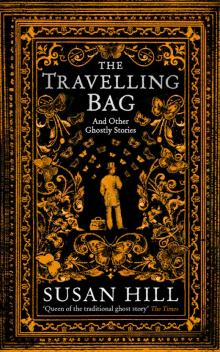 The Travelling Bag
The Travelling Bag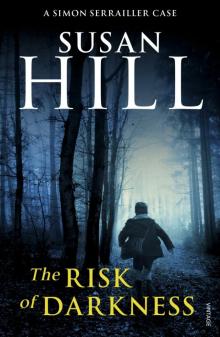 The Risk of Darkness
The Risk of Darkness A Kind Man
A Kind Man Black Sheep
Black Sheep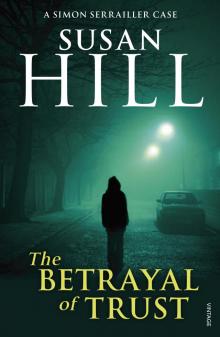 The Betrayal of Trust
The Betrayal of Trust The Service of Clouds
The Service of Clouds Betrayal of Trust
Betrayal of Trust The Small Hand
The Small Hand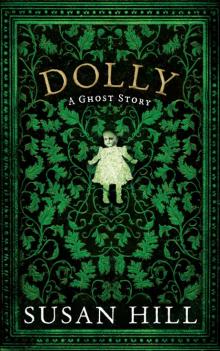 Dolly
Dolly Jacob's Room Is Full of Books: A Year of Reading
Jacob's Room Is Full of Books: A Year of Reading The Vows of Silence
The Vows of Silence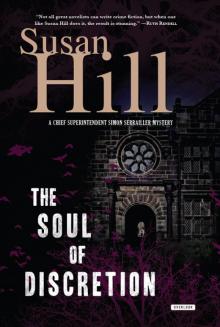 The Soul of Discretion
The Soul of Discretion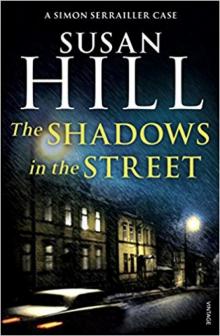 The Shadows in the Street
The Shadows in the Street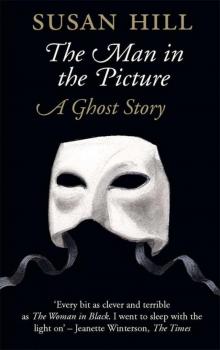 The Man in the Picture
The Man in the Picture Air and Angels
Air and Angels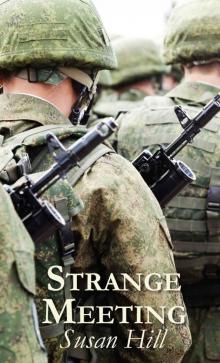 Strange Meeting
Strange Meeting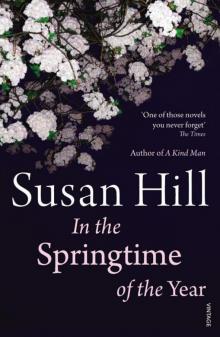 In the Springtime of the Year
In the Springtime of the Year Howards End Is on the Landing: A Year of Reading From Home
Howards End Is on the Landing: A Year of Reading From Home From the Heart
From the Heart Old Haunts
Old Haunts The Mist in the Mirror
The Mist in the Mirror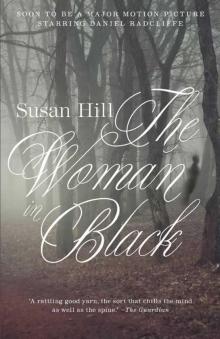 The Woman in Black: A Ghost Story
The Woman in Black: A Ghost Story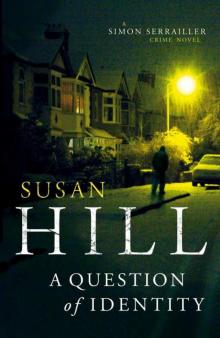 A Question of Identity (Simon Serrailler 7)
A Question of Identity (Simon Serrailler 7)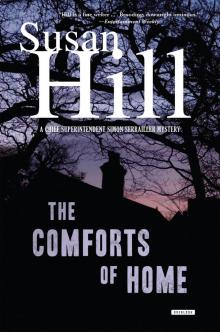 The Comforts of Home
The Comforts of Home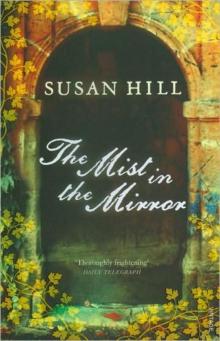 Mist in the Mirror
Mist in the Mirror Jacob's Room is Full of Books
Jacob's Room is Full of Books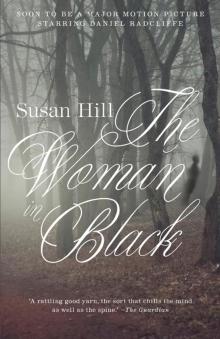 The Woman in Black
The Woman in Black Howards End is on the Landing
Howards End is on the Landing